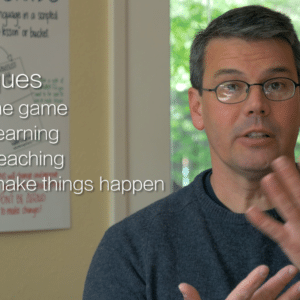When fluency hunting, you are never concerned with translations or explanations, because you are always looking to acquire an intuitive, whole-body understanding of the language or skill through riddle-me-this.
Meaning is a complete, whole-body experience, not an intellectual one.
Discovery, revelation, insight, the “Eureka!” moments of our lives are most richly felt, and most deeply absorbed, when they are gifts we give ourselves.
In WAYK language acquisition, there are some things we talk a lot about, and there are other things we never even mention. The techniques, the “rules of the game”, setting-up games and debriefing how they went – these are constantly on our lips and under discussion. But the meaning of the language in which we play is left completely alone, and may almost seem irrelevant to play.
There is nothing so satisfying as seeing a player grasp the meaning of an interaction on a deep, personal, internal level (or being that player yourself). This is often accompanied by giggling, “a-ha!” looks of surprise, or other emotional responses, further strengthening the mnemonic hold the player has on what they just absorbed. In accelerated learning, these personal, emotional experiences are worth their weight in gold, and impossible to fabricate or coerce.
Introducing the technique in language acquisition
We introduce this just in time for translation requests, or general questions like “what does the language we’re using mean?”
Short: “Technique: Riddle-me-this. Experiencing the meaning of the language is a gift you get to give yourself – we won’t interfere or take that away from you. Besides, this isn’t a learning game. You’ll riddle-me-this what everything means at your own pace. Take all the time you need.”
Applying the technique to language acquisition
Avoid, as much as possible, any explanations of structure, meaning, or grammar. Any time a player requests such explanations, shrug your shoulders and mark riddle-me-this. Remember, meaning is something that you experience, not something you can explain. Explanations just give the illusion of answering the search for meaning – and they slow down what needs to happen anyway, which is a visceral experience of “what it means”.
But what about…?
Sometimes new players will express a strong opinion that they learn by understanding “why” things mean what they mean, or through translations. This is simply not the way humans acquire fluency, though it is absolutely one way humans learn “about” things. Though a player may sincerely want an explanation for their own comfort, and though we offer many techniques for creating the safest, most comfortable environment possible, we encourage you to not satisfy player requests for explanations.
How you run the game, is modeling for your players, and therefore how you’re asking them to run the game. Explanations breed explanations. To transmit the culture of play as quickly as possible, it’s best to start right away by jumping directly into play and staying there.




